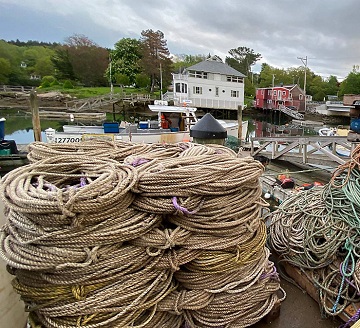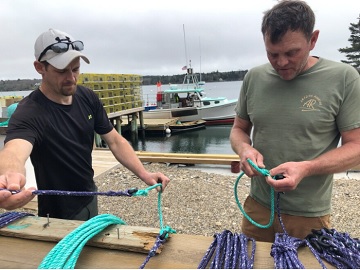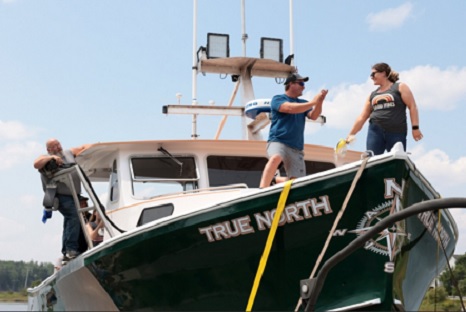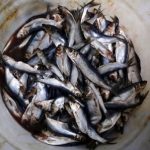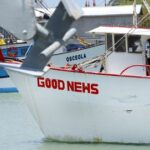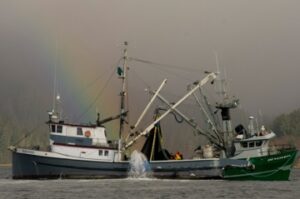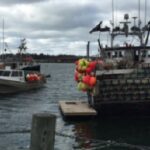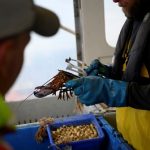Tag Archives: Maine Lobstering Union
Floating offshore wind experts say they want to coexist with Maine lobstermen, but lobstermen say no thanks
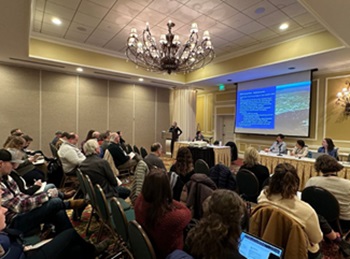 Lobstermen asked pointed questions Thursday about a planned offshore floating wind array that they fear will take away fishing grounds and potentially disrupt the species they rely on to make a living. “Offshore wind overall we have a lot of issues with,” Virginia Olsen, political director of the Maine Lobstering Union said. “We know it will be industrializing our ocean and as fishermen we just don’t want to see that happen.” During the Thursday presentation, state officials and consultants working on the floating array emphasized they want to work toward “coexistence” between the new technology and the fishing industry. But that didn’t sit well with some of the lobstermen, who said they don’t want to co-exist with the turbines. more, >>click to read<< 06:50
Lobstermen asked pointed questions Thursday about a planned offshore floating wind array that they fear will take away fishing grounds and potentially disrupt the species they rely on to make a living. “Offshore wind overall we have a lot of issues with,” Virginia Olsen, political director of the Maine Lobstering Union said. “We know it will be industrializing our ocean and as fishermen we just don’t want to see that happen.” During the Thursday presentation, state officials and consultants working on the floating array emphasized they want to work toward “coexistence” between the new technology and the fishing industry. But that didn’t sit well with some of the lobstermen, who said they don’t want to co-exist with the turbines. more, >>click to read<< 06:50
Maine lobstermen sue to stop new electronic tracking
 Maine lobstermen are suing to stop a new suing to stop they argue violates their constitutional rights. In a lawsuit filed in U.S. District Court for the District of Maine, the five lobstermen, who are being supported by the Sustainable Maine Fishing Foundation, the nonprofit arm of the Maine Lobstering Union, argue the rules present an “immediate and serious risk” to their constitutional right to privacy. The lobstermen are being represented by the Portland law firm of McCloskey, Mina, Cunniff & Frawley LLC. The new rules, which the Maine Department of Marine Resources began implementing on Dec. 15, 2023, require lobstermen with federal permits to install electronic trackers that monitor the movement of their boats 24/7. more, >>click to read<< 13:42
Maine lobstermen are suing to stop a new suing to stop they argue violates their constitutional rights. In a lawsuit filed in U.S. District Court for the District of Maine, the five lobstermen, who are being supported by the Sustainable Maine Fishing Foundation, the nonprofit arm of the Maine Lobstering Union, argue the rules present an “immediate and serious risk” to their constitutional right to privacy. The lobstermen are being represented by the Portland law firm of McCloskey, Mina, Cunniff & Frawley LLC. The new rules, which the Maine Department of Marine Resources began implementing on Dec. 15, 2023, require lobstermen with federal permits to install electronic trackers that monitor the movement of their boats 24/7. more, >>click to read<< 13:42
House Republicans rebuff move by Golden to block offshore wind in Gulf of Maine lobster area
 Majority Republicans in the U.S. House of Representatives rejected an attempt by Rep. Jared Golden, D-Maine, to use federal spending to block offshore wind development in a lobster fishing area of the Gulf of Maine. Golden, who tried to amend 2024 appropriations legislation for the Department of Interior, said he will try again to bar offshore wind development in what’s known as Lobster Management Area 1. His measure sought to prevent funding to lease, license, permit or provide any authorization to develop offshore wind energy that could jeopardize lobster fishing. “Offshore wind development in the Gulf’s most productive fishing grounds is a threat to Maine fishermen’s way of life,”>>click to read<< 07:28
Majority Republicans in the U.S. House of Representatives rejected an attempt by Rep. Jared Golden, D-Maine, to use federal spending to block offshore wind development in a lobster fishing area of the Gulf of Maine. Golden, who tried to amend 2024 appropriations legislation for the Department of Interior, said he will try again to bar offshore wind development in what’s known as Lobster Management Area 1. His measure sought to prevent funding to lease, license, permit or provide any authorization to develop offshore wind energy that could jeopardize lobster fishing. “Offshore wind development in the Gulf’s most productive fishing grounds is a threat to Maine fishermen’s way of life,”>>click to read<< 07:28
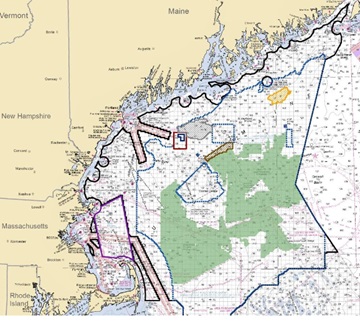
Maine Lobstermen Win Giant Carveout From Offshore Wind Development Area
The U.S. Bureau of Ocean Energy Management (BOEM) is rolling out designated offshore wind leasing areas off the lower 48 states at a rapid clip, racing to meet the Biden administration’s target of 30 gigawatts of capacity by 2030. For the latest – a 3.5 million acre parcel in the Gulf of Maine – it has decided to dodge a looming fight with fishing and environmental interests. The newly-released Draft Wind Energy Area for the Gulf of Maine has enough room for up to 40 gigawatts of offshore wind capacity, with a focus on floating wind installations in deeper water. The size is notable, but the most conspicuous part is the part that was left out: Lobster Management Area 1, a strip along the coast that is essential to the powerful Maine lobster industry. >>click to read<< 09:08
Fishermen’s Alliance Highlights Offshore Wind Threat to Haddock, Lobster Fisheries in Gulf of Maine
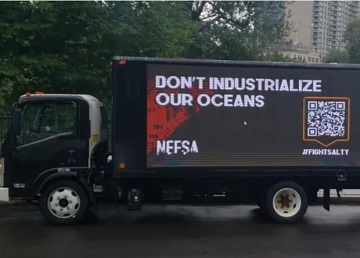 An alliance of groups representing New England’s fishermen is highlighting scientific research that suggests offshore wind development could have “population-scale effects” on key fish and crustacean species in the Gulf of Maine, including electromagnetism-induced deformities in lobsters. The New England Fishermen’s Stewardship Association (NEFSA) on Monday released an “Offshore Wind Research Summary” summarizing the existing scientific research on the environmental impact of offshore wind power development. The scientific evidence, they believe, shows that offshore wind development would have unpredictable and potentially harmful consequences for key marine species, such as lobster and haddock. >click to read< 17:37
An alliance of groups representing New England’s fishermen is highlighting scientific research that suggests offshore wind development could have “population-scale effects” on key fish and crustacean species in the Gulf of Maine, including electromagnetism-induced deformities in lobsters. The New England Fishermen’s Stewardship Association (NEFSA) on Monday released an “Offshore Wind Research Summary” summarizing the existing scientific research on the environmental impact of offshore wind power development. The scientific evidence, they believe, shows that offshore wind development would have unpredictable and potentially harmful consequences for key marine species, such as lobster and haddock. >click to read< 17:37
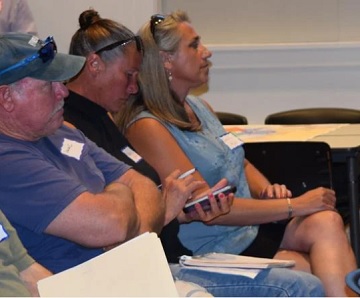
Maine Fishermen, scientists find flaws in potential wind energy lease areas
BOEM officials called the meeting to review newly released draft maps of where federal leases could be offered in the Gulf of Maine, known as the “call” area. They wanted fishermen’s feedback to see where the maps fell short based on what fishermen know from working on the water. “This is very difficult for our industry to face,” said Dustin Delano, New England Fishermen Stewardship’s chief operating officer, former vice president of the Maine Lobster Association and a fourth-generation lobsterman out of Friendship. “A lot of us feel this is going to wipe us off the map.” The fishermen present were unconvinced but resigned. >click to read< 07:55
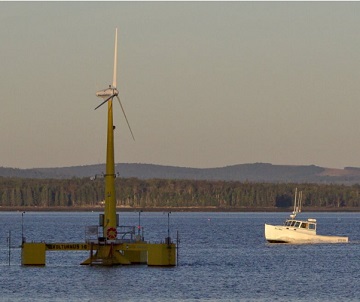
U.S. Rep. Jared Golden introduced a bill in Congress that would prevent offshore wind development in key fishing area
The bill would prevent the federal Bureau of Ocean Energy Management from potentially hurting the fishing and lobstering industries in Maine, said Golden, D-2nd District. The legislation also would launch an assessment of how federal agencies like the BOEM and the National Marine Fisheries Service study the effects of offshore wind development and engage with industry groups. Lobster Management Area 1 is the zone closest to the shores of Maine and stretches along the entire coast. That’s where Virginia Olsen, a commercial lobsterman and director of the Maine Lobstering Union, says a majority of Maine fishing and lobstering is concentrated. “I think this is the exclusion zone that the Maine Lobster Union and the area that the (Maine Lobstermen’s Association) would agree is most important economically to the fishery,” Golden said. >click to read< 19:46

Federal court hears arguments from Maine lobstermen appealing right whale regulations
A federal appeals court heard arguments Friday from the Maine Lobstermen’s Association, which is challenging a government plan to regulate the fishery and conserve endangered right whales. The Maine Lobstermen’s Association had promised to take its latest appeal of federal fishing regulations all the way to the U.S. Supreme Court, if necessary. But lobstermen hope they’ll avoid that prospect, especially with Paul Clement, an attorney with more than 100 past Supreme Court appearances, representing Maine. >click to read< 07:22
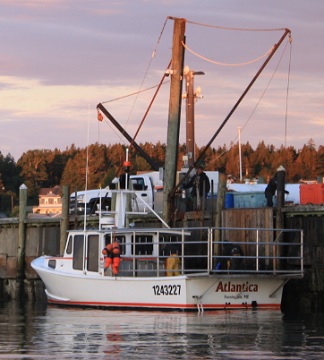
Maine wants to transform how the US manages the lobster fishery.
Patrick Keliher, Maine’s Department of Marine Resources commissioner, has argued that the fishery needs more “tools in the toolbox.” Now, with the most time he’s had in recent memory to sit down and craft new measures, he is hoping that the dawn of “dynamic management” in Maine is here. What is dynamic management? In theory, it’s a simple strategy to keep fishermen fishing, while also making way for whales. The Gulf of Maine would be monitored, with listening devices in the water and planes in the sky, for right whales. If signs of right whales are detected, fishermen would have to clear their traps out of the area. Dynamic management has been pitched by Maine before, and a version of it is being used in parts of the Canadian snow crab fishery. >click to read< 14:35

Whole Foods to stop selling Gulf of Maine lobster
The Marine Stewardship Council suspended the certification of sustainability for the fishery last week, citing a failure to comply with laws meant to protect the North Atlantic right whale. The fishery was also added to the Monterey Bay Aquarium’s “red list” in September due to the same fishing practices which the seafood watch program deems harmful. Whole Foods says it will stop buying Gulf of Maine lobster until the suspension is lifted or the fishery is taken off the red list. The Maine Lobstermen’s Association feels the MSC decertification is the “direct result of the federal government’s overreach and its misuse of science in overestimating risk from the Maine lobster fishery,” >click to read< 08:25

Court decision offers new hope for Maine lobstermen fighting new regulations
A small sign of hope for Maine Lobstermen as a federal judge in D.C. District Court has ruled that new lobster fishing restrictions designed to protect North Atlantic Right Whales will be delayed until 2024 to give the government time to draft more effective regulations. “We need to have time to get this done right,” said Maine Lobstering Union Executive Director Virginia Olsen. Judge Boasberg had previously ruled that fishing restrictions issued by the National Oceanic and Atmospheric Administration, or NOAA didn’t go far enough to protect the whales. His new ruling sends the current biological opinion, which is the document containing the rules and the science behind them, back to NOAA. >click to read< 10:43

How Did Gulf of Maine Lobster Get Canceled?
No one confessed to knowing that, just a few weeks before, the Monterey Bay Aquarium’s Seafood Watch, an agenda setting program for sustainability-minded seafood buyers and chefs, had shocked the industry by placing Gulf of Maine lobster on its “red list” of species to avoid. Not Dodie Neo, an Ohioan retiree who’d been in line for 45 minutes when I approached her. Knowing about the red listing, however, wouldn’t have stopped her from ordering. “The aquarium has a right to put lobster on whatever list it wants,” she told me. “And I have a right to eat it.” Way down the road, at Highroller Lobster Co., in Portland’s Old Port, the crowd skewed younger and hipper, but wait times were just as long and customers just as surprised to hear about lobster getting canceled. After some discussion, most in line seemed to agree with Rick Conlin, visiting from western Massachusetts, that it didn’t much matter. “I vote for the lobstermen,” he said. >click to read< 10:23
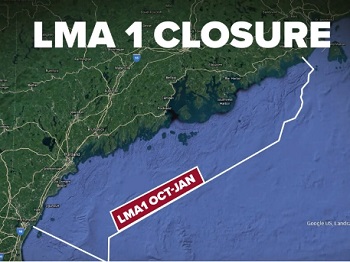
Maine Lobstering Union drops part of lawsuit against NMFS
The Maine Lobstering Union is agreeing to drop part of its lawsuit against the National Marine Fisheries Services, where the federal agency is closing a 960-square-mile section of the Gulf of Maine to lobster fishers. The area, known as LMA 1, is home to hundreds of fishermen like Tyler Turner of Portland. If the closure stands without a state-level court injunction, then Turner said he would lose out on at least half his income. “It’s going to be catastrophic. It’s going to be crippling. I just want to be able to work. I can relieve myself. I don’t need someone telling me where I can’t go,” Turner said. Video, >click to read< 08:14

Fishery interests urge judge to rule in lobster lawsuit
Parties in a lobster industry lawsuit filed against federal regulators are urging a judge to make a decision in the case because its outcome affects a parallel case that the parties have to act on. The federal judge considering this decision was the same who ruled last month that new regulations to protect endangered right whales do not go far enough and violate both the Endangered Species Act and Marine Mammal Protection Act. In that case, U.S. District Judge James Boasberg asked the parties to propose remedies. The lobster association’s case takes aim at newly enacted and proposed federal regulations to protect the whales, which the association says are invalid because they are based on flawed assumptions and calculations. The parties need to know the court’s opinion so they can develop proposed remedies that Boasberg ordered in the parallel lawsuit brought by conservation groups. >click to read< 17:01

Fishery regulators will discuss possible rise in minimum lobster size
Fishing regulators will gather in Virginia next week to talk about the potential of raising the minimum size lobsters need to be in order to be harvested by New England fishermen. The Atlantic State Marine Fisheries Commission’s lobster management board is meeting on Tuesday to discuss the implications of a proposal that would install new minimum size limits and other regulations for the crustaceans, either gradually over time or triggered by lobster populations dipping below a certain level. The proposal was drafted to protect the lobster population as surveys show indications of potential future decline. The idea has rankled many Maine lobstermen,,, >click to read< 09:25

“I guess they’re too weak.” Weak lobstering gear recalled as new whale regs approach
The weak link made by Plante’s Buoy Sticks was pulled off shelves by the company this week, taking away one of the handful of gear options at lobstermen’s disposal to meet new federal rules that go into effect May 1. One retailer said their shop was told the links were believed to be breaking too easily. Plante’s links are one of three models approved by NOAA,,, Virginia Olsen, Maine Lobstering Union, said she sent a notice to her members about the issue and hoped the recall would prompt NOAA to review allowing fishermen the easier option of putting knots in their ropes to make them weaker. “It truly would be a great assistance to us if those knots were acceptable,” she said. >click to read< 14:21
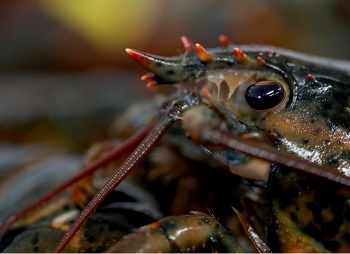
Federal windfall won’t put a stop to state lobster industry relief bills
Although Maine’s lobster industry is set to receive $17 million in federal funding as part of the 2022 omnibus spending package, it is unlikely to affect two bills going through the Legislature that seek more than $30 million in state funds for the industry. The spending bill will bring more than $200 million in funding for projects across the state. For the lobster industry, it includes $14 million to help lobstermen comply with new federal regulations intended to protect endangered North Atlantic right whales, set to take effect May 1, along with $760,000 for the Department of Marine Resources to conduct outreach and education among lobstermen, and $2.3 million for right whale research, monitoring and conservation. >click to read< 17:28
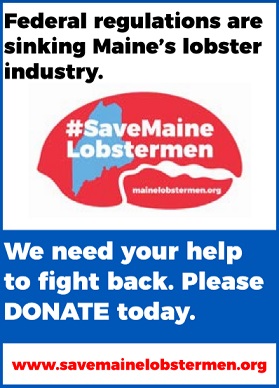
Lawmakers endorse legal fund for Maine lobstermen
A legislative committee reversed course Tuesday, voting to support a roughly $900,000 fund to pay for the lobster industry’s legal fight against federal rules that aim to protect endangered North Atlantic right whales. Two advocacy groups, the Maine Lobstermen’s Association and the Maine Lobstering Union, would split the funding. The Marine Resources committee’s majority voted against the measure last week. >click to read< 16:30

U.S. lobster set to feed another Chinese New Year as demand booms
The week-long holiday, commonly known as the Spring Festival or the Lunar New Year, is typically one of the busiest times for the U.S. lobster business. Appetite for the crustaceans remains strong in China this year, despite pandemic-related challenges to transportation and logistics, according to U.S. lobster industry members. “I have orders every day. Whether I can get them all on the airplanes every day becomes a question,” Bill Bruns, operations manager at The Lobster Co. >click to read< 08:16
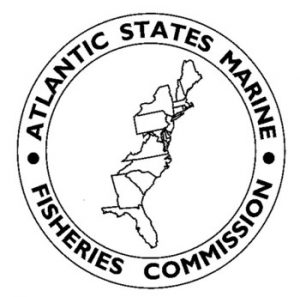
Lobstermen fear offshore tracking data would be used against them
An arm of the Atlantic States Marine Fisheries Commission is considering implementing the tracking requirements on federally-permitted lobster and Jonah crab fishermen in order to collect data on where and how they fish. “As these uses are developing in their discussions about how to divvy up that ocean space, it will be really critical to understand where the important fishing grounds are for the U.S. lobster fishery so those can be maintained,” said Caitlin Starks, a fishery management plan coordinator at the commission. >click to read< 08:22 What bullshit this is.
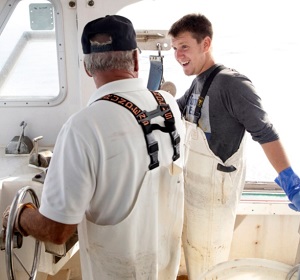
Virginia Olsen: People in Maine’s fishing industry are pleading for rational policies, not denying them.
As a member of the Maine Lobstering Union and a multi-generational lobsterman from Stonington, I read with interest The Lobster Trap, a collaboration between The Boston Globe and the Portland Press Herald. On one hand, I was impressed by the authors’ captivating storylines on the people and families who comprise our multi-generational industry and the recognition of the day-to-day challenges confronting us. On the other hand, I could not help viewing some of the series’ broad-brush inferences and conclusions as inaccurate, unfair and condescending. Precious few lobstermen qualify as wealthy “one-percenters,” as the authors suggest. The Maine lobsterman is not an “average worker,” and any comparison is an unfair characterization, whether made directly or by inference. >click to read< By Virginia Olsen 10:19

Oh sure! Trowels, Not Traps: PETA Proposes New Jobs for People in the Lobster Industry
The U.S. Supreme Court just denied a request by the Maine Lobstering Union to lift a ban on lobster fishing in the Gulf of Maine between October and January, which was enacted to protect endangered North Atlantic right whales from becoming fatally entangled in fishing gear and ultimately going extinct, so this morning, PETA sent a letter to the union’s CEO, Mike Yohe, dangling a lifeline. Because people in the lobster industry complained that the ban threatens their livelihood, PETA is offering to help cover the cost of retraining them in nonviolent occupations, including photography and gardening. >click to read< 14:55

Supreme Court denies lobstermen’s bid to halt Gulf of Maine fishing restrictions
The Supreme Court on Friday denied a request by lobster fishers to halt environmental protections that restrict fishing in a large swath of the Gulf of Maine. The application, filed earlier this week by a lobster fishers’ union and two lobster fishing companies, was rejected without comment by Justice Stephen Breyer, who handles emergency matters arising from the region. >click to read< 13:13

Lobstermen ask Supreme Court to halt restrictions meant to protect whales
The protections in question restrict the use of lobster traps in nearly 1,000 square miles in the Gulf of Maine between October and January. They are intended to protect the North Atlantic right whale,,, In the emergency application, the union and fishing companies said the restrictions would curtail fishing by more than 100 of the state’s “largest and most productive” boats, many of which only fish in the restricted area. “These fishermen and their communities have no other means to make a living except by fishing in these waters during this specific time of year, and even the loss of one season will see their vessels repossessed and their gear obsolete due to changing regulations with no funds to update them,” the application states. >click to read< 13:16 Lobstering union petitions U.S. Supreme Court to overturn Gulf of Maine closure – The Maine Lobstering Union has filed a petition asking to plead its case before the U.S. Supreme Court in an effort to reopen the area, which is slated to be closed through January – and every subsequent October through January – in an effort to protect the critically endangered North Atlantic right whale. >click to read< 17:20
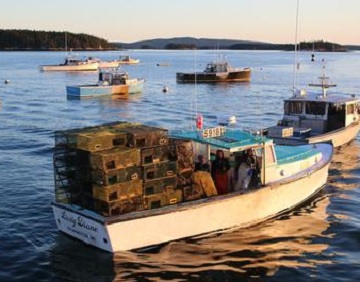
NOAA orders lobster fishing gear out of offshore zone
After a month-long court battle, an appeals court upheld the closure on November 16 U.S. Rep. Jared Golden, a Maine Democrat, said that the annual closure from October 1 to January 31 sets a dangerous precedent. It “will give federal agencies a green light to pursue regulatory actions that could devastate communities without any regard for whether or not those efforts are grounded in facts and data,” he said in a statement. “It’s regulations like this one that make people distrust government. Instead of looking out for hardworking people, our government cares more about appeasing deep-pocketed environmental groups that can litigate our lobster fishery out of existence,” Golden said. >click to read< 09:19







